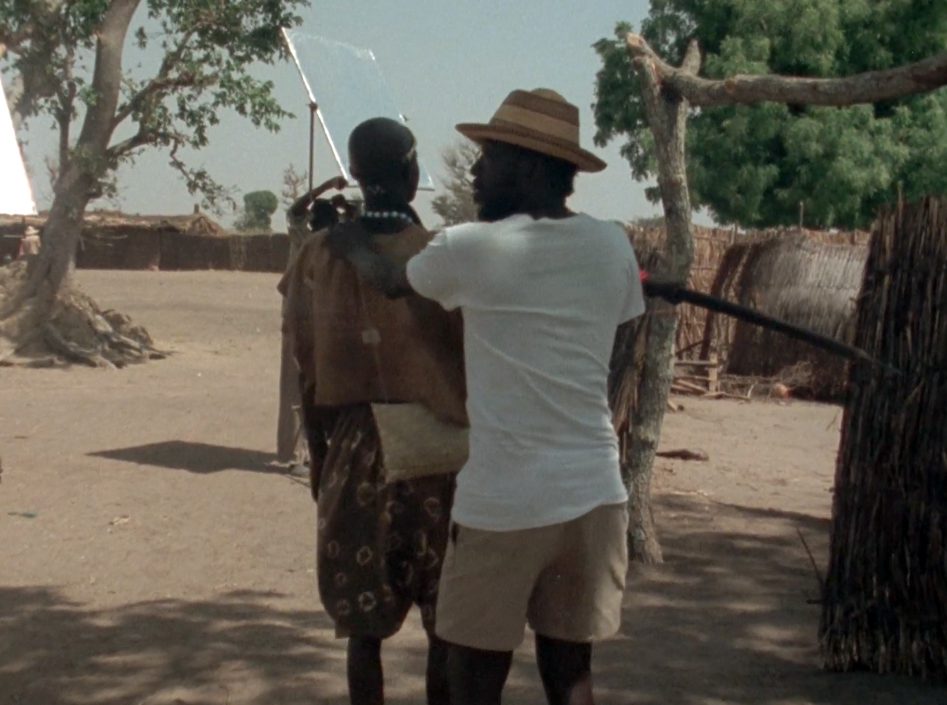68th International Short Film Festival Oberhausen, Oberhausen, Germany
30 Apr 2022 - 09 May 2022

L'envers du décors, Paulin Soumanou Vieyra, Senegal, 1981
Learning from Africa – Oberhausen shows a large scale programme of African cinema
Filmmaking on the African continent is the same as everywhere else, only under tougher conditions. Every finished film was like a miracle, the Burkinabe filmmaker Idrissa Ouédraogo (1954-2018) once commented. It is these conditions that have given rise to an entrepreneurial and artistic inventiveness that could be a model for Western countries, too. In its Theme programme “Synchronize! Pan-African Film Networks”, the International Short Film Festival Oberhausen follows exactly these processes. Rather than a “best of” of pan-African cinema, it is a demonstration of its variety, distinctive characteristics and unique production processes. The programme comprises 23 films from 10 countries including Algeria, Cameroon or Senegal, screened in Oberhausen between 4 and 9 May and curated by Marie-Hélène Gutberlet and Annett Busch (Women on Aeroplanes).
A younger generation
The Theme programme presents a younger generation of African and diasporic filmmakers, most of whom are yet to be discovered in Germany and Europe. In Résonances d’un rêve (2021), for example, Rim Harrabi, Rua Osmane, Salimata Bâ and Yosra El-Gazzar, better known as the Mouathequat/DOX BOX collective, trace the lines of connection between the Tunisian student revolt of 1968 and the Tunisian Spring 2021. In Street 66 (2018), Ayo Akingbade (Oberhausen winner 2017 for Tower XYZ) follows the Ghanaian housing activist Dora Boatemah and her work in Brixton, South London. The Cameroonian director Jean-Pierre Bekolo in La grammaire de grand mére (1996) portrays the great Senegalese filmmaker Djibril Diop Mambéty; in the series Our Wishes (2017/2020), Bekolo recalls an ignominious chapter in the history of German colonial rule in Cameroon. Jasmina Metwaly (Egypt/Poand) talks to a tailor who makes uniforms for the Egyptian military in Anwar (Badrawi’s atelier, 2019). Amelia Umuhire (Rwanda/Germany) shows how migrants are trying to master their lives in Europe in her series Polyglot, while Fatou Kandé Sendor (Senegal) portrays the 18-year old Mossane, who lives in Dakar and dreams of hip hop and dancing, in her series Walabok (2021).
History and pivotal moments
Their works are complemented by recent and older films that make pivotal moments, systems of reference and production methods in pan-African cinema visible. These include, among others, L’envers du décor (1981), Paulin Soumanou Vieyra’s famous observation of Ousmane Sembène and his crew at work, Mohamed Challouf’s portrait of Tahar Cheriaâ, the film critic and founder of the Carthage Film Festival, the first pan-African film festival ever, Tahar Cheriaâ à l’ombre du Baobab (2014) or Challouf’s OUAGA, capitale du cinéma (2000) about the history of FESPACO in Ouagadougou, one of the most important pan-African film festivals until the present day. In Concerto pour un exile (1968), which won a prize at Oberhausen in 1969, Desiré Ecaré shows the life of a group of African students in Germany. The oldest film in the programme is Integration Report 1 (1960) by US filmmaker Madeline Anderson who shows how a black civil rights movement is forming in Kenya.
“In 1983, King Sunny Adé, Nigerian musician and entrepreneur, released an album called Synchro System. The cover shows eighteen musicians, each with a different instrument. Synchronizing with and through Synchro System does not mean marching in lockstep, it means juju, motion sequences. An asynchronous-synchronous polyrhythmic universe simultaneously opens up and coordinates itself. The Synchro System idea as a kind of manual for cooperation (and what we can learn from it), as a cross-border audio-visual reference system, but also as a catalysing impulse, was the method and starting point of our programme selection,” the curators explain.
The film programmes are accompanied by a panel discussion on “Working Methods” with Salimata Bâ, Yosra El-Gazzar, Abdessamad El Montqassir, Rim Harrabi, Rua Osmane and others, moderated by Hélène Gutberlet and Annett Busch.
The curators
Annett Busch (Trondheim) and Marie-Hélène Gutberlet (Frankfurt/Main) have been running the Agency for Flying Ideas Women on Aeroplanes ( http://woa.kein.org) together and in various constellations since 2017. They develop methods that are realized in research-based exhibitions and transversal Evening Classes, as Inflight Magazines or meetings with stations in Berlin, Lagos, Bayreuth, London, Warsaw, Frankfurt/Main, Johannesburg, Kigali. Both have been curating films by filmmakers from the African continent and its diaspora for 20 years. Their work revolves around film as the vehicle of a history whose narrative and mediation is different from what the history books would have us believe. That enables us to learn about perspectives and experiences in public space, to unfold them and reveal forms of non-hegemonial knowledge.